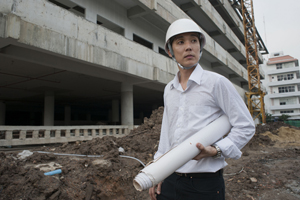The scale, frequency and severity of disasters will continue to grow in coming years, with up to 375 million people expected to be affected by climate-related disasters each year by 2015. To develop new and innovative ways of managing risk, the UK Department for International Development (DFID), the World Bank (WB) and the Global Facility for Disaster Reduction and Recovery (GFDRR), are partnering to improve the evidence base for sovereign disaster risk finance and insurance (DRFI).
This US$3.2 million project, managed by the WB-GFDRR Disaster Risk Financing and Insurance (DRFI) Program, will develop and test a quantitative impact appraisal framework for sovereign DRFI programs, such as those that make use of government disaster reserve funds, lines of contingent credit, and catastrophe insurance instruments. Betterevidence in this area will enable national governments and international donors to be smarter in their support, maximising their impact, and ultimately reducing the human and economic costs of disasters.
In recent years, there has been tremendous growth in the number and type of complex and innovative sovereign DRFI instruments available to help governments of developing countries manage the financial risks arising from natural disasters. Despite this, there is limited evidence on the impact, effectiveness, and efficiency of strategies which use such instruments. This project aims to enhance the capacity of policymakers to make critical decisions as to when DRFI programs are effective components of a comprehensive approach to managing the financial risk associated with disasters. This will help maximize the humanitarian and development impact of DRFI programs and ensure value for money.

An engineer works on the site.
The project, running from 2013-2016, aims to develop a conceptually sound, quantitative impact appraisal tool that:
- Uses a forward-looking impact appraisal approach to account for the probabilistic nature of the impact of sovereign DRFI programs rather than being heavily influenced by recent disaster events, as such events are rare and unlikely to reflect future risks accurately;
- Quantifies trade-offs between many of the key dimensions of a sovereign DRFI program;
- Generates results that are sufficiently robust to model and parameter uncertainty but are still able to guide evidence-based decision making;
- Can complement more qualitative measures of impact; and
- Results in headline figures on the impact of sovereign DRFI programs on development and poverty that are meaningful for decision makers.
The project team will collaborate with a range of organizations from the insurance, public finance, governmental, international development and research sectors, and utilize the expertise of the World Bank and its strong network of partners, to provide innovative thought and leadership in an area that is rapidly becoming a key priority for many governments. Initially, it will develop a conceptual framework for impact appraisals for sovereign DRFI programs, before applying this framework to the five country case studies starting in 2014.
To learn more, please click here to download a PDF and read a more detailed overview. See the blog here.
Contacts:
Daniel Clarke, Senior Specialist, Disaster Risk Financing & Insurance Program, FCMNB and GFDRR, World Bank, dclarke2@worldbank.org
Olivier Mahul, Program Manager, Disaster Risk Financing & Insurance Program, FCMNB and GFDRR, World Bank, omahul@worldbank.org
